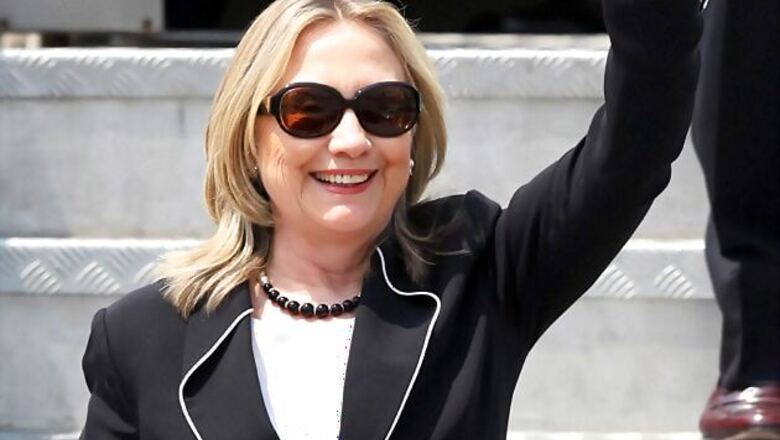
views
Washington: The United States will suspend sanctions barring American investment in Myanmar in response to political reforms there, but will keep those laws on its books to discourage backsliding, Secretary of State Hillary Clinton said on Thursday.
"Today we say to American business: invest in Burma and do it responsibly," Hillary said during an appearance with Myanmar's Foreign Minister, Wunna Maung Lwin, on the Southeast Asian nation's first official visit to Washington in decades as ties between the two countries warm rapidly.
Hillary said Washington would issue a general license to permit US investments across Myanmar's economy, and US energy, mining and financial service companies were all now free to look for opportunities in the nation formerly known as Burma.
But Hillary stressed that the laws underpinning US sanctions on Myanmar would remain as Washington seeks to maintain its leverage while pushing the reclusive country's government further on democratic reforms.
"We are suspending sanctions. We believe that is the appropriate step for us to take today," Hillary said. "We will be keeping the relevant laws on the books as an insurance policy, but our goal and our commitment is to move as rapidly as we can to expand business and investment opportunities."
Hillary said the United States would maintain its arms embargo on Myanmar, and urged the country's new civilian-led government to take further steps to exert its control over the military, which ruled the country for decades.
Thursday's announcement marked the latest step in a rapid rapprochement between the United States and Myanmar, which has seen a dramatic series of political reforms in the past year.
Myanmar's reformist, quasi-civilian government took office a year ago, ending five decades of military rule, and has started overhauling its economy, easing media censorship, legalizing trade unions and protests, freeing political prisoners and agreeing to ceasefires with a dozen ethnic rebel armies.
Nobel Peace Prize laureate and pro-democracy icon Aung San Suu Kyi has been elected to and taken a seat in parliament.
Suu Kyi's National League for Democracy, Myanmar's biggest opposition force, won a 1990 election by a landslide but the country's military refused to cede power and for two decades suppressed the party's activities, putting many of its members in prison.
In response to the reforms, United States has promised to begin unwinding the complex web of US sanctions that have contributed to the country's isolation and driven it closer to its powerful neighbor, China.
Hillary said Derek Mitchell, the State Department's coordinator for Burma policy, would be nominated to return to the country as US ambassador and Maung Lwin said his government had appointed its current permanent representative to the United Nations to fill its ambassadorial slot in Washington.
Pro-democracy advocates have urged the United States to move cautiously, saying sanctions are an important tool to maintain pressure on Myanmar's government to follow through on pledges of greater democratic openness.
Hillary stressed that US investments in Myanmar would be subject to the highest standards of corporate responsibility, and said Washington would be alert to ensure that those who abuse human rights or engage in corruption do not benefit from the economic opening between the two countries.
Maung Lwin, asked when the country's remaining political prisoners would be freed, said the government would grant further amnesty as appropriate.


















Comments
0 comment